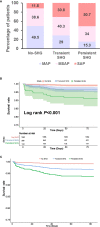Impact of admission and early persistent stress hyperglycaemia on clinical outcomes in acute pancreatitis
- PMID: 36277713
- PMCID: PMC9585288
- DOI: 10.3389/fendo.2022.998499
Impact of admission and early persistent stress hyperglycaemia on clinical outcomes in acute pancreatitis
Abstract
Background: To determine the impact of glucose levels at admission and during first week (early phase) on clinical outcomes in patients with acute pancreatitis (AP) and to investigate the relationship between stress hyperglycaemia (SHG) and hypertriglyceridaemia (HTG).
Methods: Two independent and prospective databases were retrospectively analysed (n = 1792). Patients admitted with pain of less than 48 hours and confirmed AP were included. SHG was defined as admission blood glucose ≥ 10.00 mmol/L (non-diabetic) or ≥ 16.67 mmol/L (diabetic). Blood glucose records for the first week were inspected to determine whether SHG lasted ≥ 48 hours (persistent) or < 48 hours (transient). Clinical outcomes were compared between designated patient groups using multivariate and trend analyses. The correlation between SHG and HTG (serum triglyceride ≥ 5.65 mmol/L) was also analysed.
Results: On admission, SHG was present in 27.8% (499/1792) patients; during the first 48 hours of admission, transient and persistent SHG was found in 31% (556/1792) and 8.0% (144/1792) patients, respectively. Admission SHG was associated with higher incidence of persistent organ failure, acute necrotic collection, major infection, and mortality as well as prolonged length of hospital stay (all P < 0.05). Duration of SHG was also associated with worsened clinical outcomes (all P < 0.05). In HTG-AP patients, more severe clinical outcomes were observed in those who concomitantly had SHG (P < 0.05).
Conclusions: Admission and persistent SHG during the first week of admission worsens clinical outcomes of AP patients. These effects are more pronounced when admission HTG co-existed.
Keywords: acute pancreatitis; blood glucose; clinical outcomes; hypertriglyceridaemia; stress hyperglycaemia.
Copyright © 2022 Yang, Shi, Yao, He, Zhu, Li, Li, Li, Liu, Deng, Jin, Liu, Lu, Windsor, Sutton, Zhu, Xia and Huang.
Conflict of interest statement
The authors declare that the research was conducted in the absence of any commercial or financial relationships that could be construed as a potential conflict of interest.
Figures


Similar articles
-
Hypertriglyceridaemia-associated acute pancreatitis: diagnosis and impact on severity.HPB (Oxford). 2019 Sep;21(9):1240-1249. doi: 10.1016/j.hpb.2019.01.015. Epub 2019 Mar 15. HPB (Oxford). 2019. PMID: 30885545
-
Incidence and clinical characteristics of hypertriglyceridemic acute pancreatitis: A retrospective single-center study.World J Gastroenterol. 2022 Aug 7;28(29):3946-3959. doi: 10.3748/wjg.v28.i29.3946. World J Gastroenterol. 2022. PMID: 36157550 Free PMC article.
-
Stratified analysis and clinical significance of elevated serum triglyceride levels in early acute pancreatitis: a retrospective study.Lipids Health Dis. 2017 Jun 27;16(1):124. doi: 10.1186/s12944-017-0517-3. Lipids Health Dis. 2017. PMID: 28655321 Free PMC article.
-
The effect of serum triglyceride concentration on the outcome of acute pancreatitis: systematic review and meta-analysis.Sci Rep. 2018 Sep 20;8(1):14096. doi: 10.1038/s41598-018-32337-x. Sci Rep. 2018. PMID: 30237456 Free PMC article.
-
Mechanisms linking hypertriglyceridemia to acute pancreatitis.Acta Physiol (Oxf). 2023 Mar;237(3):e13916. doi: 10.1111/apha.13916. Epub 2023 Jan 13. Acta Physiol (Oxf). 2023. PMID: 36599412 Review.
Cited by
-
Acute Pancreatitis as an Unusual Culprit of Diabetic Ketoacidosis in a Nondiabetic: A Case-Based Review.Case Rep Endocrinol. 2023 Aug 22;2023:9122669. doi: 10.1155/2023/9122669. eCollection 2023. Case Rep Endocrinol. 2023. PMID: 37649470 Free PMC article.
-
Incidence and risk factors of fasting hyperglycaemia following first-attack acute pancreatitis before discharge: a retrospective study.BMC Gastroenterol. 2023 Jun 12;23(1):203. doi: 10.1186/s12876-023-02775-7. BMC Gastroenterol. 2023. PMID: 37308836 Free PMC article.
-
The Stress Hyperglycemia Ratio as a Predictor of Clinical Outcomes in Acute Pancreatitis: A Retrospective Cohort Study.J Clin Med. 2025 Jul 14;14(14):4970. doi: 10.3390/jcm14144970. J Clin Med. 2025. PMID: 40725663 Free PMC article.
-
Immune-Enhancing Treatment among Acute Necrotizing Pancreatitis Patients with Metabolic Abnormalities: A Post Hoc Analysis of a Randomized Clinical Trial.Gut Liver. 2024 Sep 15;18(5):906-914. doi: 10.5009/gnl230326. Epub 2024 Feb 15. Gut Liver. 2024. PMID: 38356344 Free PMC article. Clinical Trial.
-
Correlation of hyperglycemia and balthazar classification in patients with acute pancreatitis.Pak J Med Sci. 2024 Nov;40(10):2271-2276. doi: 10.12669/pjms.40.10.6687. Pak J Med Sci. 2024. PMID: 39554662 Free PMC article.
References
Publication types
MeSH terms
Substances
LinkOut - more resources
Full Text Sources
Medical

